

ANNUAL
REPORT 2021 - 2024

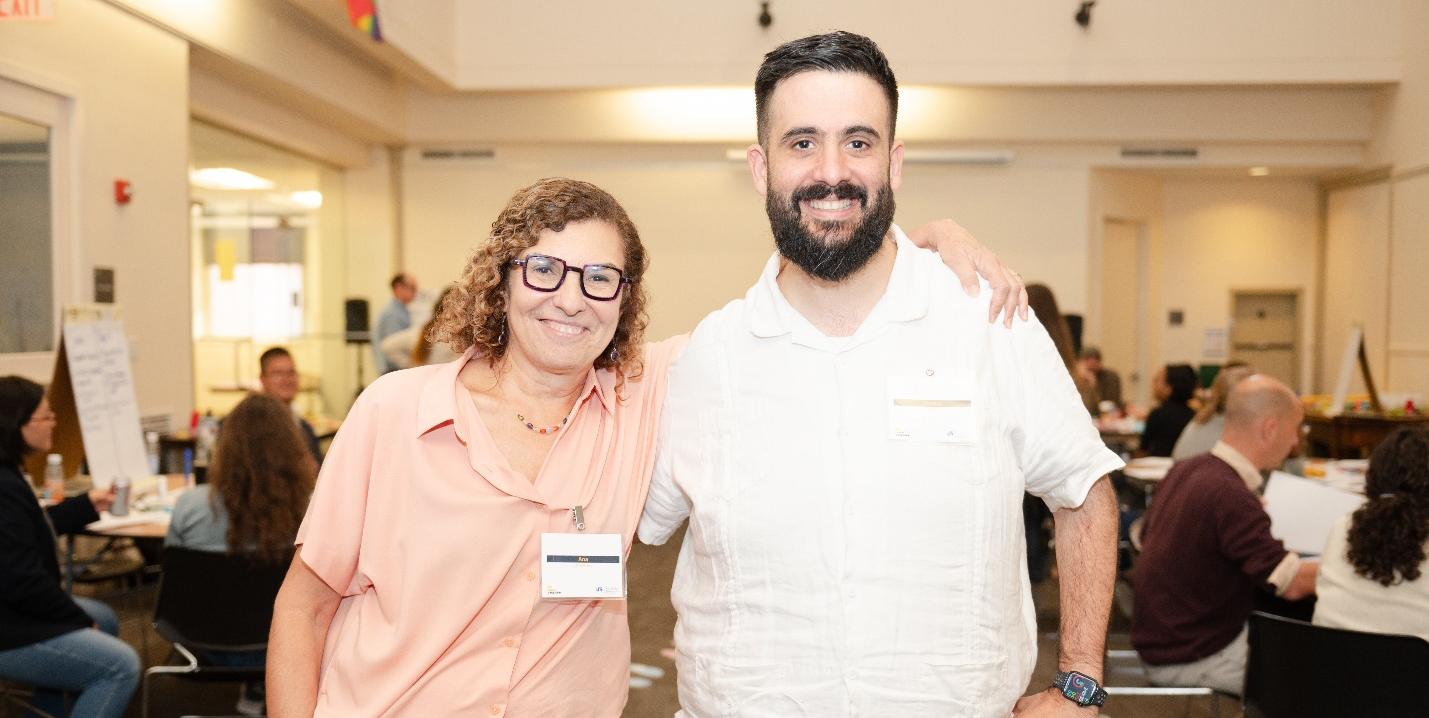
As the Urban Health Collaborative looks ahead to its tenth year in 2025, we reflect on the UHC’s rapid growth and increased impact since its inception. The hiatus in our production of Annual Reports only makes this 2021-2024 report ever more impressive. The last three years have represented a period of growth and increased commitment to the UHC mission of improving health in cities by increasing scientific knowledge and public awareness of urban health challenges and opportunities, and by identifying and promoting actions and policies that improve population health and reduce health inequities. Increasing threats to urban health from climate change and social inequality have only made our mission more relevant than ever.
Although the COVID-19 pandemic now seems like a distant dream (nightmare for many), much of the work you will see in this report highlighting the unequal impacts of the pandemic and evaluating policies to mitigate those inequalities remains relevant today. You will also see new areas of research, especially research focused on understanding the impacts of climate change on urban health, both domestically and globally. And of course, our other work on using novel data and methods to inform and support policy, engaging communities and policy makers and disseminating our results broadly remain core to our work.
These achievements were only made possible by the commitment and hard work of our faculty, staff, and trainees and the support from our many partners and funders. We look forward to celebrating our 10th anniversary by also recovering an old UHC tradition: the biennial Urban Health Symposium which will return on September 4-5th, 2025. We hope to see you in Philadelphia and other cities around the globe.
Ana V. Diez Roux Usama Bilal Directors, Urban Health Collaborative
ABOUT THE UHC
The Drexel University Urban Health Collaborative (UHC) was created to leverage the power of data, research, education, and partnerships to make cities healthier, more equitable, and environmentally sustainable.
MISSION
Our mission is to improve health in cities by increasing scientific knowledge and public awareness of urban health challenges and opportunities, and by identifying and promoting actions and policies that improve population health and reduce health inequities.
KEY THEMES
Data for Policy and Community Action
Data is crucial to motivate and support urban health action. We partner with others to compile and make visible data on health and health inequities in Philadelphia as well as cities across the US and globally.
Climate Change and Health
Climate change is a major threat to health in cities worldwide. However, cities also present opportunities for climate change mitigation and adaptation. We work to advance urban health action on climate change across the Americas.
Geospatial Data and Methods
Novel geospatial methods and other analytical methods can enhance understanding and support policy and advocacy. The UHC supports the use and development of novel methods in urban health.
Health and Place
The dynamics and features of places are fundamental to urban health understanding and policy. We study the multiple ways in which places impact health and their implications for policy.
Health Equity
Improving urban health equity is at the core of UHC work. We document and identify the causes of health inequities and work with others to identify policies and interventions that promote equity.
UHC BY THE NUMBERS
Fiscal Years 2022, 2023, and 2024
• 84 grants and contracts submitted
• 41 new grants awarded
• $25.9 million awarded in total
• $18.3 million in direct research expenditures
• ~450 Summer Institute participants
The UHC as of October 2024
• 35 active grants
• 16 core faculty
• 29 affiliate faculty
• 32 research staff
• 5 core administrative staff
• 9 temporary staff
• 8 postdoctoral fellows
• 16 doctoral students
• 9 master’s students
• 1 co-op student
• 2 visiting scholars
OUR TEAM
The Collaborative is made up of 16 core faculty, 29 affiliate faculty, 32 research staff members, and 9 temporary staff members. It engages and supports over 30 trainees from the undergraduate to postdoctoral levels, funded internally through UHC fellowships or through external grants and contracts. The UHC also has a visiting scholar program to host emerging and established researchers from around the world. Experts from across the Dornsife School of Public Health lead the five UHC cores (Administrative Core, Training Core, Research and Data Core, Community Engagement Core, and Policy Core), with input from the UHC Steering Committee. Several tenure track and research faculty are administratively supported by the UHC, and 29 faculty members from across the university are engaged as UHC faculty affiliates.
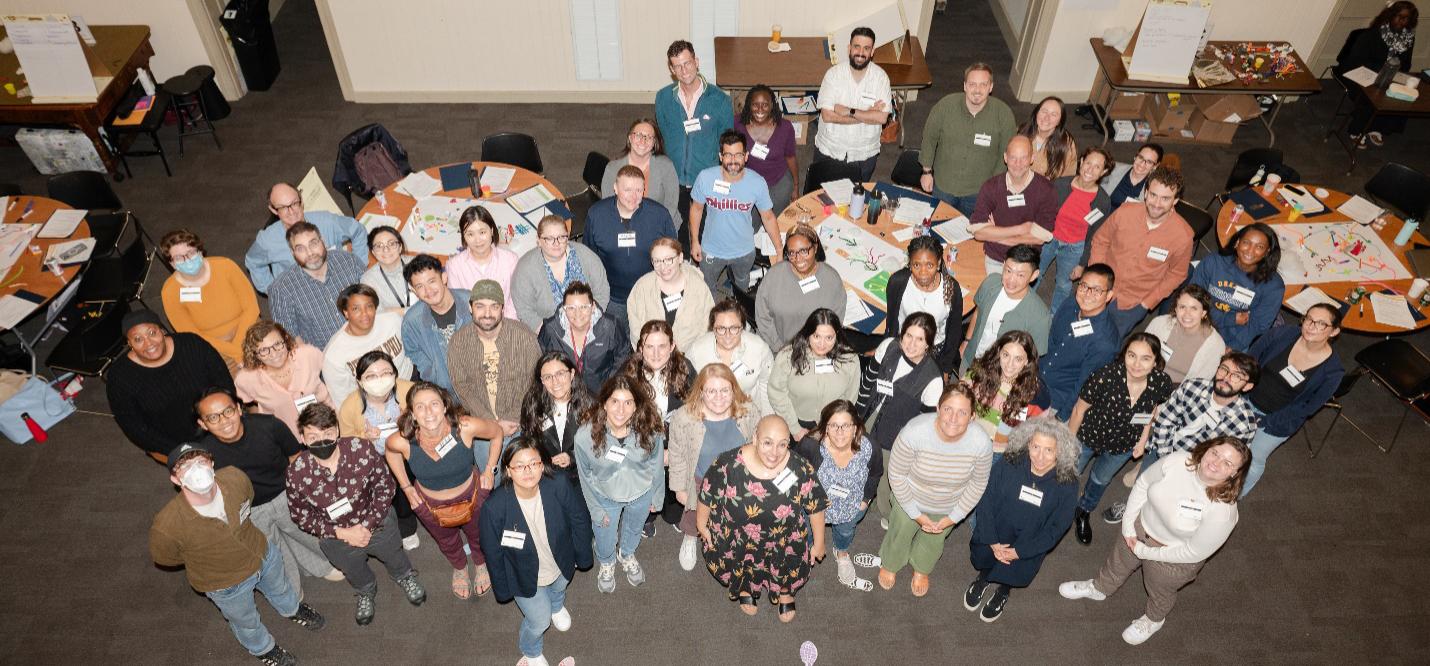
OUR FUNDERS
The UHC is generously supported by a gift from Dana and David Dornsife and by Drexel University. Funding to sustain our growth, scholarship, and engagement is also provided by a diverse set of external funders. In fiscal years 2022-2024, the UHC submitted 84 grant proposals and was awarded $25.9 million. Active grants and contracts during this period have provided approximately $18.3 million in direct research expenditure. Annual direct expenditures were approximately $5.5 million, $5.9 million, and $6.9 million in fiscal years 2022, 2023, and 2024, respectively. These grants support the work of faculty, research staff, postdoctoral researchers, and students at both the doctoral and master’s levels. Funders of projects from 2021-2024 included:
• American Cancer Society
• Arnold Ventures
• Big Cities Health Coalition
• Centers for Disease Control and Prevention
• Cotswold Foundation
• de Beaumont Foundation
• European Commission/European Union
• Independence Blue Cross Foundation
• Lacuna Foundation
• Lazarex Foundation/Emerson Collective
• National Association of County and City Health Officials
• National Institutes of HealthFogarty International Center
• National Institutes of HealthNational Heart, Lung, and Blood Institute
• National Institutes of HealthNational Institute of Aging
• National Institutes of HealthNational Institute of Allergy and Infectious Diseases
• National Institutes of HealthNational Institute of Diabetes and Digestive and Kidney Diseases
• National Institutes of HealthNational Institute of Neurological Disorders and Stroke
• National Institutes of Health -
National Institute on Alcohol Abuse and Alcoholism
• National Institutes of HealthNational Institute on Minority Health and Health Disparities
• Pennsylvania Department of Health
• Philadelphia Department of Public Health
• Robert Wood Johnson Foundation
• The Wellcome Trust
• US Department of Education
• US Department of Justice
• William Penn Foundation
2024 STEERING COMMITTEE
The UHC Steering Committee, composed of faculty, staff, and student representatives, is a key component of UHC governance and provides guidance to the UHC Directors on a range of issues, including best practices and policies and the overall direction of the UHC.
STRATEGIC PLANNING RETREAT 2024
SCULPTING
THE FUTURE OF THE UHC
STEERING COMMITTEE
Giancarlo Anfuso, MS
Doctoral Fellow Representative
Opeyemi Babajide, PhD, MSc Postdoctoral Fellow Representative
Usama Bilal, MD, PhD, MPH Co-Director
Autumn Ciarrocchi
Deputy Director of Administration
Stephen Dickinson, PhD Staff Representative
Ana Diez Roux, MD, PhD, MPH Director
Alex Ezeh, PhD Affiliate Faculty Representative
Jana Hirsch, PhD, MES Faculty Representative
Erikka Gilliam, MS, MPH Community Engagement Core Co-Lead and ARC Representative
Jennifer Kolker, MPH Policy Core Co-Lead
Brent Langellier, PhD, MA Deputy Director of Administration
Mariana Lazo, MD, PhD, ScM Community Engagement Core Co-Lead
Félice Lê-Scherban, PhD, MPH Founding Training Core Co-Lead
Ran Li, MS Staff Representative
STEERING COMMITTEE SUPPORT STAFF
Derek Harris, MA (IDT) Executive Administrator
Claire Jensen, MSW Senior Project Manager
Kari Moore, MS
Research and Data Core Co-Lead
Leah Schinasi, PhD, MSPH Training Core Co-Lead
Alina Schnake-Mahl, ScD, MPH Policy Core Co-Lead
Lindsay Shea, DrPH, MS Affiliate Faculty Representative
Loni Tabb, PhD, MS Research and Data Core Co-Lead
UHC faculty, staff, and trainees gathered at the Friends Center in Center City, Philadelphia for a Strategic Planning Retreat in September 2024. The next day, the Steering Committee gathered to synthesize and build on the insights from the first day and chart a course forward.
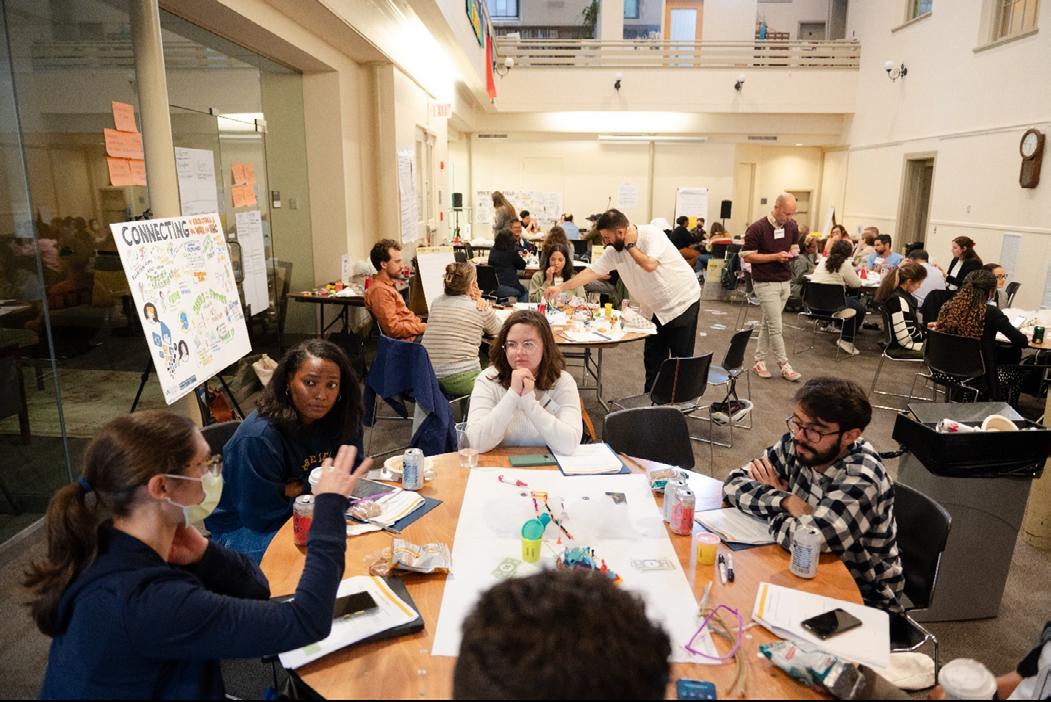
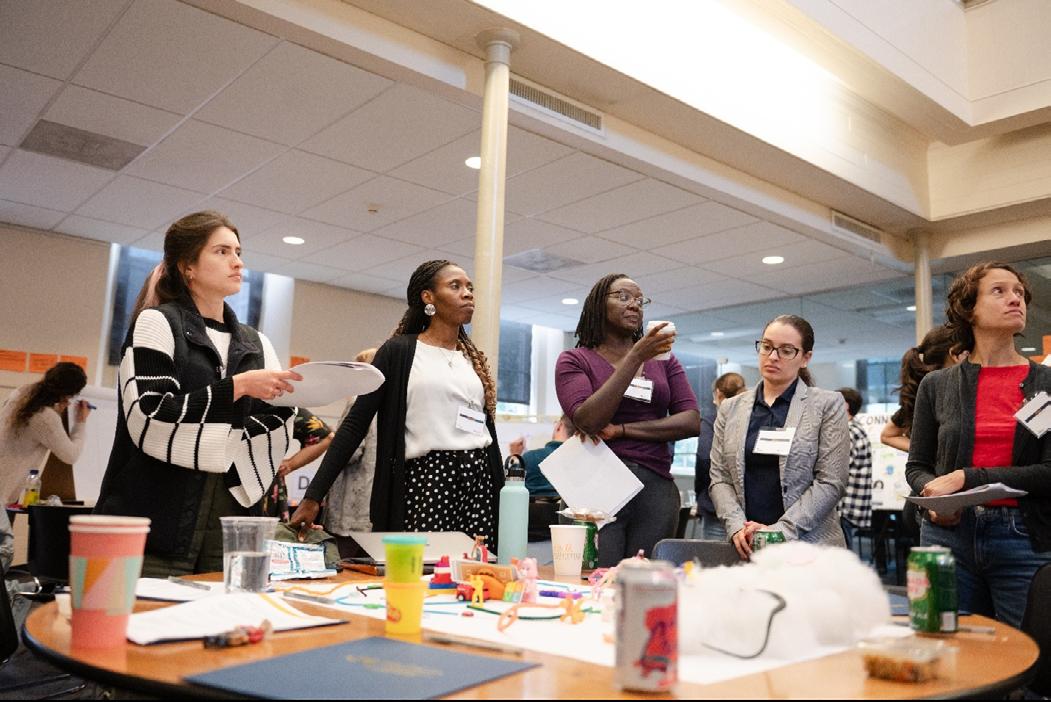
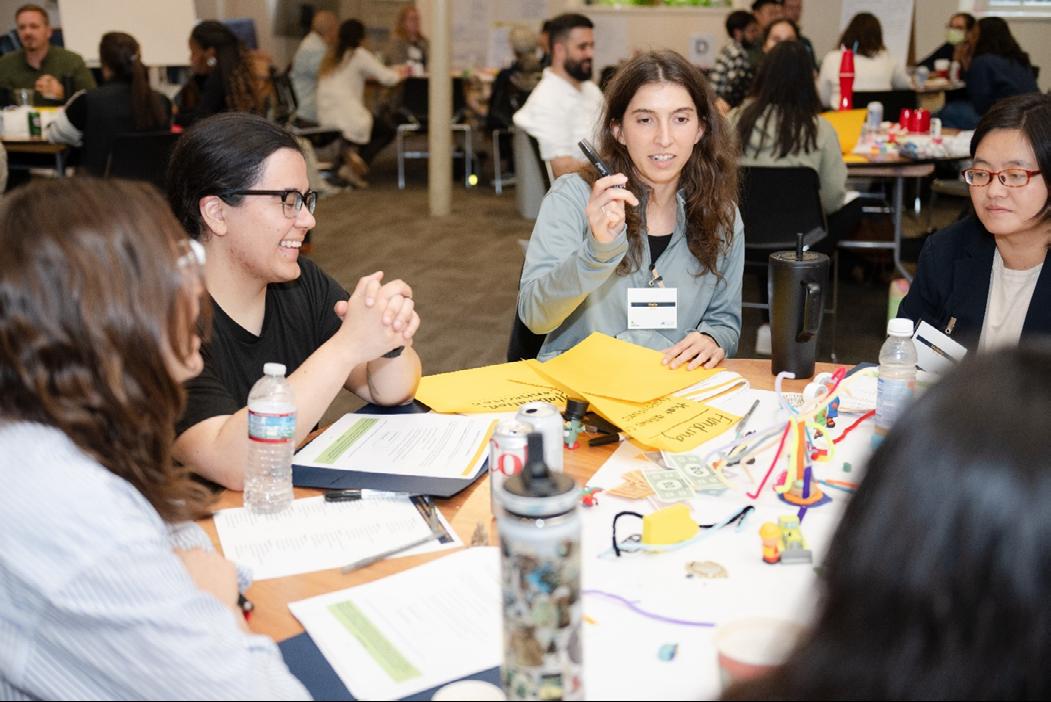
During the retreat, the UHC community identified six essential elements that will guide the development of the strategic plan. With input from the full UHC, these six themes have been summarized into six Bold Statements that will guide our work over the next few years, building on our experience over the past 10 years. Six Working Groups are currently developing strategies to make these Bold Statements a reality and will form the basis of the Updated UHC Strategic Plan which will be shared in Spring-Summer 2025.
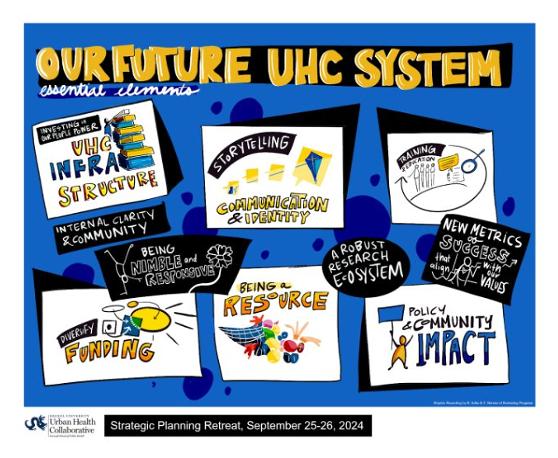
NEW GRANT AWARDS
DATA FOR POLICY AND COMMUNITY ACTION
KEY THEME 1
Data is crucial to motivate and support urban health action. We partner with others to compile and make visible data on health and health inequities in Philadelphia as well as cities across the US and globally.
Big Cities Health Coalition & Drexel Urban Health Collaborative Partnership
Ongoing
Funder: Big Cities Health Coalition
The Big Cities Health Coalition (BCHC) partnership with the UHC advances BCHC’s work by bringing faculty, expertise, and resources in policy, planning, and evaluation, as well as data knowledge and infrastructure. For the UHC, the partnership is an opportunity to advance its commitment to research, training, and policy translation in urban health locally and globally, leveraging the school’s historic expertise in public health practice in urban settings. Through this partnership, BCHC and UHC enhance their ability to meet their shared vision of improving the health of people living in our nation’s largest cities. Projects include the Big Cities Health Indicators Platform (Co-PIs: Amy Auchincloss, PhD, MPH and Ana Diez Roux, MD, MPH, PhD) and the Big Cities Health Coalition Needs Assessment (Co-PIs: Ana Diez Roux, MD, MPH, PhD and Jennifer Kolker, MPH).
Food Insecurity, Neighborhood Environment, and Weight Trajectories in Young Children: Implications for Food Assistance Policy
Awarded FY 2022
Funder: NIH-National Institute of Diabetes and Digestive and Kidney Diseases
The National Institute of Diabetes and Digestive and Kidney Diseases awarded the UHC an R01 grant to study food insecurity and its implications for children (total award: $2,677,708). Félice Lê-Scherban, PhD, MPH, is leading this project, which aims to inform implementation of the Special Supplemental Nutrition Program for Women, Infants, and Children (WIC) and other food assistance policies. It analyzes how household food insecurity is associated with weight trajectories among young children and how this association is modified by neighborhood environment and public food assistance programs.
Studying Impacts of Paid Maternity and Paternity Leave Policies on Health Outcomes in Latin America and their Potential for the United States
Awarded FY 2022
Funder: Robert Wood Johnson Foundation
The UHC was awarded a $250,000 Robert Wood Johnson Foundation grant to study the impacts of paid maternity and paternity leave policies on health outcomes in Latin America and their potential for the United States, led by Ana Ortigoza, MD, PhD, MPH, MS, and Ana V. Diez Roux, MD, PhD, MPH. The goal of this study is to examine the impact of expansions of paid maternity and paternity leave on the health of infants and adults in 366 cities from Argentina, Brazil, Chile, Colombia, Costa Rica, El Salvador, Guatemala, Mexico, Panama, and Peru.
Social and policy determinants and impacts on COVID-19 and influenza disparities
Awarded FY 2022
Funder: NIH-National Institutes of Allergy and Infectious Diseases
Alina Schnake-Mahl, ScD, MPH, was awarded a 5-year, $637,000, K01 from the National Institutes of Allergy and Infectious Diseases (NIAID) to study the social and policy determinants of COVID-19 and influenza disparities.
OTHER AWARDS FROM THIS PERIOD
WorldFAIR - Global Cooperation on FAIR Data Policy and Practice
Awarded FY 2022
Funder: European Commission
PI: Ana Ortigoza, MD, PhD, MPH, MS
Total Award: $124,762
Making the case that Supplemental Nutrition Assistance Program benefit amounts should reflect geographic variation in housing and food costs
Awarded FY 2023
Funder: Robert Wood Johnson Foundation
PI: Brent A. Langellier, PhD, MA
Total Award: $100,000
PDPH Community Health Improvement Plan (CHIP) Community Conversations
Awarded FY 2023
Funder: Philadelphia Department of Public Health (PDPH)
PI: Amy Carroll-Scott, PhD, MPH
Total Award: $31,203
Workforce Training Needs Assessment for the Philadelphia Department of Public Health
Awarded FY 2023
Funder: Philadelphia Department of Public Health (PDPH)
PI: Jennifer Kolker, MPH
Total Award: $50,728
CLIMATE CHANGE AND HEALTH
KEY THEME 2
Climate change is a major threat to health in cities worldwide. But cities also present opportunities for climate change mitigation and adaptation. We work to advance urban health action on climate change across the Americas.
Drexel Climate Change and Urban Health Research Center (Drexel CCUH)
Awarded FY 2023
Funder: NIH- National Institute on Minority Health and Health Disparities
The UHC received a multi-million dollar grant from the National Institute of Environmental Health Sciences to establish the Drexel Climate Change and Urban Health Research Center (CCUH) (total award $3,178,772). Led by Ana Diez Roux, MD, PhD, MPH, the CCUH provides the organizational structure and data infrastructure required to drive action-oriented research on the impacts of climate change on health and health inequities in diverse cities across the Americas. In March 2024, the CCUH was formally launched at an event held at the Dornsife School of Public Health.
Climate Change and Urban Health in Latin America (SALURBAL-Climate)
Awarded FY 2023
Funder: Wellcome Trust
Building upon over six successful years of the Wellcome Trust-funded Urban Health in Latin America (SALURBAL) Project, SALURBAL-Climate addresses a critical need for evidence linking climate change to health impacts across Latin America (total award $7,505,780). Led by Ana Diez Roux, MD, PhD, MPH, the project is expanding the unprecedented SALURBAL data resource, which encompasses nearly 400 cities across 11 counties and includes data on mortality, demographics, health risk factors, and physical, natural, and socioeconomic environments – in many cases at the city, sub-city, and neighborhood levels.
Urban Inequality and Spatial Distribution of Heat Mortality in Brazilian Cities
Awarded FY 2023
Funder: Wellcome Trust
The World Resources Institute (WRI), WRI Brasil, SALURBAL, and WRI Mexico are undertaking a project to understand the spatial relationship between neighborhood-scale heat mortality and neighborhood social and characteristics in two Brazilian cities and use these findings to inform public policy considerations at national and local scales (total award $960,995). Led by Usama Bilal, MD, PhD, MPH, the team is implementing a scalable local engagement methodology to align research with needs, build local capacity for action and help design public policies and interventions to mitigate impacts on health from extreme heat and other climate hazards.
OTHER AWARDS FROM THIS PERIOD
The Impact of Extreme Flood Events on Health and Health Disparities in a Changing Climate
Awarded FY 2022
Funder: Cotswold Foundation
PI: Josiah Kephart, PhD, MPH
Total Award: $50,000
GEOSPATIAL DATA AND METHODS
KEY THEME 3
Novel geospatial methods and other analytical methods can enhance understanding and support policy and advocacy. The UHC supports the use and development of novel methods in urban health.
Climate Change, the Built Environment, and Health in Informal Settlements in Colombia
Awarded FY 2023
Funder: Lacuna Foundation
Alex Quistberg, PhD, MPH was awarded a $300,034 grant from the Lacuna Foundation to collect high-quality data from informal urban settlements in Colombia, capturing how climate change affects residents’ health outcomes. Incorporating datasets from these neighborhoods can help machine learning models more accurately represent these areas and ultimately provide more accurate analysis for underserved urban areas throughout the global south.
Use of a National Retail Database to Describe Marijuana Dispensary Location and Equity
Awarded FY 2023
Funder: Drexel Medical Cannabis Research Center
Stephen Dickinson, PhD, a project manager with the Urban Health Collaborative, was recently awarded $50,000 in pilot funding from the Drexel University Medical Cannabis Research Center to create a database of marijuana dispensaries in the United States. This work will allow researchers to track trends in the geographic distribution of dispensaries and their effects on neighborhoods, particularly the low-income communities and communities of color where dispensaries tend to be clustered.
HEALTH AND PLACE
KEY THEME 4
The dynamics and features of places are fundamental to urban health understanding and policy. We study the multiple ways in which places impact health and their implications for policy.
Communities Designed to Support Cardiovascular Health of Older Adults
Awarded FY 2024
Funder: NIH-National institute on Aging
Gina S. Lovasi, PhD, MPH was awarded a continuation for “Communities Designed to Support Cardiovascular Health of Older Adults,” which examines emerging questions about neighborhood change and to meet current information needs on how the built environment affects behavioral and stress pathways to chronic disease (total award $1,291,309). The R56 funding supports ongoing data collection in the REasons for Geographic and Racial Differences in Stroke (REGARDS) cohort using items from Perceptions About Change in Environment and Residents (PACER), a tool piloted in Philadelphia.
Social Determinants of Fatty Liver Disease and its Racial/Ethnic Disparities: The Multi-Ethnic Study of Atherosclerosis (NIH-NIDDK)
Awarded FY 2024
Funder: NIH-National Institute of Diabetes and Digestive and Kidney Diseases
Dr. Mariana Lazo, MD, PhD, ScM and her team were awarded a grant from the National Institutes of Health, National Institute of Diabetes and Digestive And Kidney Diseases, to study pathways between social determinants as well as the physical and social environments of communities and fatty liver disease risk (total award $2,242,215). This work also seeks to identify underlying structural determinants of excess risk among low-socioeconomic status and ethnic minority populations.
Assessing whether individual- and neighborhood-level indicators of social determinants of health improve the prediction of COVID-19 outcomes
Awarded FY 2022
Funder: Robert Wood Johnson Foundation
Pricila Mullachery, PhD, MPH, was recently awarded a $100,000 grant from the Robert Wood Johnson Foundation’s Health Data for Action (HD4A) program, managed by Academy Health, to study social determinants of health (SDOH) and COVID-19 in a diverse cohort of patients in the Greater Philadelphia Region. Leslie McClure, PhD, MS, Chair of the Department of Epidemiology and Biostatistics, Dornsife School of Public Health, and Usama Bilal, MD, PhD, MPH, assistant professor at the UHC, will be co-investigators in this study.
OTHER AWARDS FROM THIS PERIOD
Public Health Campus on Cedar Place-Based Evaluation
Awarded FY 2022
Funder: Independence Blue Cross Foundation
PI: Amy Carroll-Scott, PhD, MPH
Total Award: $319,848
Identifying alcohol-related and built environment factors that can be modified to prevent pedestrian road traffic deaths
Awarded FY 2022
Funder: NIH-National Institute on Alcohol Abuse and Alcoholism
PI: Gina Lovasi, PhD, MPH
Total Award: $241,609
West Philadelphia Promise Zone Byrne Criminal Justice Innovation Project
Awarded FY 2022
Funder: Department of Justice-Mt. Vernon Manor
PI: Amy Carroll-Scott, PhD, MPH
Total Award: $109,396
Evaluation of Engagement and Context for Kaboom Play Everywhere Installations
Awarded FY 2022
Funder: William Penn Foundation
PI: Jana A. Hirsch, MES, PhD
Total Award: $100,000
Sustainability of violence prevention after vacant lot greening in Philadelphia: 10 year follow-up Awarded FY 2023
Funder: Arnold Ventures
PI: Amy Carroll-Scott, PhD, MPH
Total Award: $94,311
The Impact of The Social Determinants of Health on Disparities in Maternal Health for African Immigrant Women in Philadelphia
Awarded FY 2024
Funder: Cotswold Foundation
PI: Opeyemi Babajide, PhD, MSc
Total Award: $60,000
Neighborhood Determinants of Community Disaster Resilience
Awarded FY 2024
Funder: NIH-National Institute on Aging
PI: Jana A. Hirsch, MES, PhD
Total Award: $586,497
HEALTH EQUITY
KEY THEME 5
Improving urban health equity is at the core of UHC work. We document and identify the causes of health inequities and work with others to identify policies and interventions that promote equity.
Social Determinants of Cardiovascular Disease Risk Over the Life Course
Awarded FY 2022
Funder: NIH-Fogarty International Center
The UHC and the Institute for Nutrition of Central America and Panama have partnered to establish a training program focused on developing the research capabilities of trainees and local capacity building in the conduct of policy-relevant research on the influence of social determinants and place-based factors on CVD risk across the lifespan. The training program, led by Brisa Sánchez, PhD and Ana V. Diez Roux, MD, PhD, MPH, was awarded a 5-year, $1,233,047 grant from the National Institutes of Health and the Fogarty International Center.
Comparing the impact on health equity among immigrant populations of sanctuary and anti-sanctuary state preemption policies
Awarded FY 2024
Funder: Robert Wood Johnson Foundation
Brent Langelier, PhD, MA and Alina Schnake-Mahl, ScD, MPH were awarded funding from the Robert Wood Johnson Foundation to study how state preemption laws affecting immigrant sanctuary policies impact the lives and health of Hispanic and Latino people in the U.S. (total award $125,355). Preemption laws are enacted by upper levels of government, such as the state or county, to prevent lower levels of government, such as cities and towns, from enacting certain policies. Many states preempt a number of policies related to firearms, zoning, and workers’ rights.
The Collaborative Center for Legal Epidemiology: Evaluating law as an intervention to improve health outcomes and reduce disparities related to HIV, Viral Hepatitis, STDs, and Tuberculosis
Awarded FY 2024
Funder: Centers for Disease Control and Prevention
Alina Schnake-Mahl, ScD, MPH and Ana Diez Roux, MD, PHD, MPH, along with researchers from The Center for Public Health Law Research at Temple University Beasley School of Law (CPHLR) and Stony Brook University, were awarded a five-year, $3.89 million grant from the US Centers for Disease Control and Prevention National Center for HIV, Viral Hepatitis, STD, and Tuberculosis Prevention.
Factors Driving Excess Mortality Levels and Inequities during the COVID-19 pandemic in US Metropolitan Areas
Awarded FY 2023
Funder: NIH-Office of the Director
Usama Bilal, MD, PhD, MPH was awarded a DP5 supplement to examine excess mortality and inequities in excess mortality in US cities during 2020 and 2021, and to explore whether city-level factors are associated with excess mortality (total award $357,179). The project will fill gaps in our knowledge regarding the unequally distributed impacts of the COVID-19 pandemic across urban areas of the US. It will also fund three doctoral students at the UHC to conduct research on disparities in excess mortality in US cities.
OTHER AWARDS FROM THIS PERIOD
COVID Equity Plans Evaluation
Awarded FY 2022
Funder: Vose River Charitable Fund-The National Association of County and City Health Officials
PI: Jennifer Kolker, MPH
Total Award: $100,000
A Multilevel Study of Breast Cancer Survivorship Among Black Women: Social Determinants, Lifestyle Patterns, and Inflammatory Pathways
Awarded FY 2024
Funder: American Cancer Society
PI: Amy Carroll-Scott, PhD, MPH
Total Award: $85,910
Administrative supplement for the INCAP-Drexel training program on CVD
Awarded FY 2024
Funder: NIH-Fogarty International Center
PI: Brisa Sanchez, PhD
Total Award: $149,904
RACIAL JUSTICE AND URBAN HEALTH
The UHC Anti-Racism Committee (ARC) includes faculty, staff, and student representatives from across the UHC. ARC is dedicated to fostering meaningful organizational change to combat racism and promote equity in urban health. Guided by the UHC’s mission to improve health outcomes in cities and reduce health disparities, the ARC works to address the systemic barriers that structural racism creates.
Our approach is rooted in principles of inclusion, intersectionality, and community engagement, and we are dedicated to creating a sustainable framework for antiracist transformation. This work involves investing in BIPOC leadership, adopting anti-racist practices, and engaging in research that promotes equity within our organization and the communities we serve.
In the past year, the ARC has focused on translating its vision into actionable outcomes through collaborative efforts and a commitment to continuous learning. Some of the work accomplished this year includes:
•Integrating anti-racism into new hire orientation: Ensuring all new employees understand the UHC’s commitment to anti-racism from the outset.
•Standardizing hiring and interview processes: Developing structured and equitable practices for UHC-wide recruitment to promote diversity and inclusion.
•Building strategic partnerships: Establishing relationships with other anti-racism-focused organizations at Drexel and Dornsife to align efforts and share resources.
•Providing policy feedback: Collaborating with the UHC Steering Committee to offer insights and recommendations on policies and initiatives to promote equity.
By embedding anti-racism in its strategic planning and maintaining open dialogue through regular updates at UHC Steering Committee and All-UHC meetings, the ARC continues to drive progress toward a more inclusive and equitable organization.

CLIMATE CHANGE AND URBAN HEALTH
One major area of work for the UHC includes generating evidence to support urgently needed action to address the impacts of climate change on health and health equity in cities in the US and globally. The UHC is home two new major initiatives in this area and is leading the University in climate change and health research. One is the recently launched Drexel Climate Change and Urban Health Research Center (CCUH) with funding from the National Institute of Minority Health and Health Disparities. The overall goal of this exploratory center project (total award $3,178,772) is to build capacity for advancing policy-relevant research in urban health in the US and abroad. The project leverages an existing UHC partnership with the Big Cities Health Coalition as well as ongoing work in Philadelphia and partnerships that are part of the SALURBAL (Urban Health in Latin America) Study. It has a unique focus not only on research but on capacity building and policy and community engagement.
A second major project on climate change and health led by the UHC is SALURBAL Climate. SALURBAL Climate is a continuation of the Wellcome Trust-funded SALURBAL study that was renewed in late 2023 with a climate change and health focus, bringing the total award for SALURBAL to over 20 million dollars. This project engages a large team spanning 11 institutions, most of them in Latin America, and represents 11 countries in the region. This is complemented by another award (total award ~1 million dollars) in partnership with the World Resources Institute focused on understanding intra-urban differences by neighborhood in the health impacts of heat to develop targeted policies to protect those most vulnerable. Another project, supported by the Lacuna Foundation, is exploring the use of artificial intelligence to gather data on how climate change impacts health in informal urban settlements in Colombia.
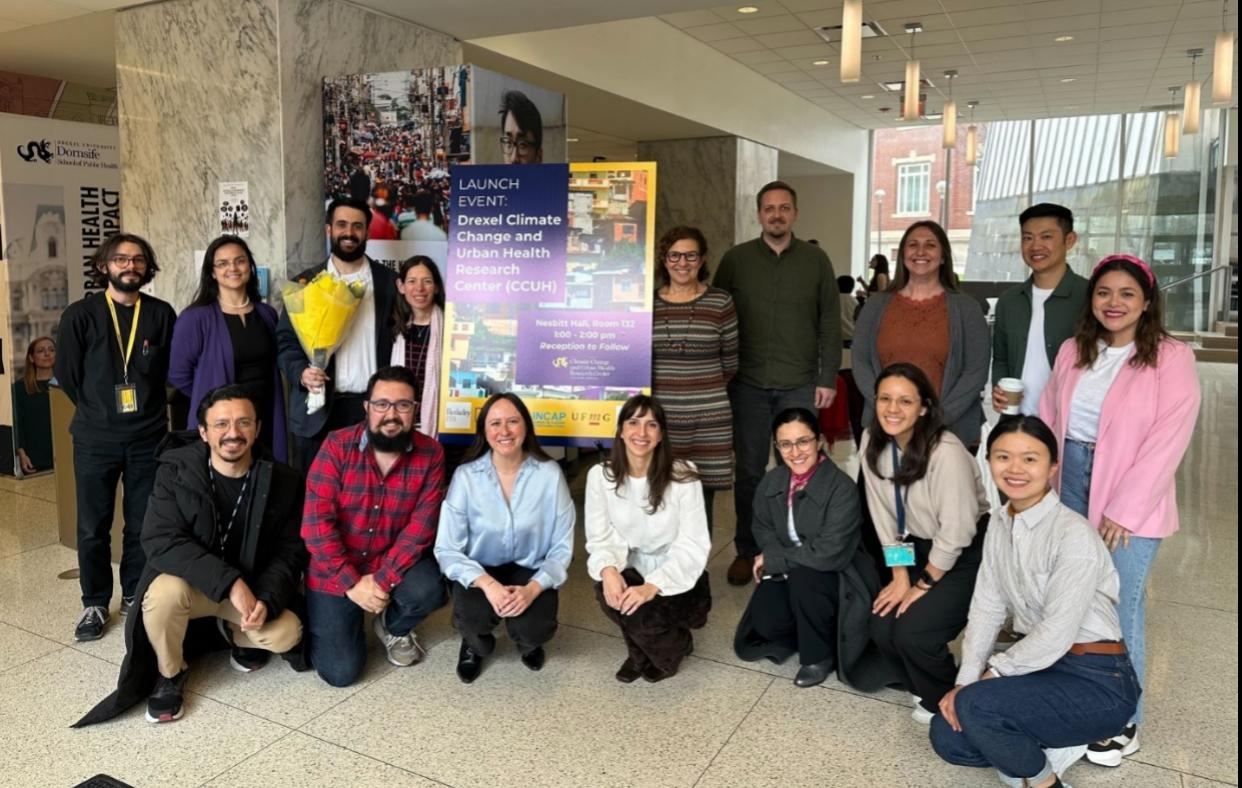
POLICY EVALUATION AND ENGAGEMENT FOR URBAN HEALTH
During this period, the UHC has conducted research that addresses critical health disparities and informs policies aimed at improving health equity. The UHC’s work has been supported by a variety of key grants and collaborative partnerships, focusing on social determinants of health, the impacts of policy on marginalized populations, and legal interventions to reduce health disparities. The UHC’s research and policy efforts have provided valuable insights into the relationship between social policies, legal frameworks, and health equity.
In addition, the UHC’s Policy Core continued to support the UHC’s policy research and engagement work. During this period, it launched its Hot Topics in Urban Health Policy blog series, held workshops for the UHC on research dissemination for policymakers and understanding how the Philadelphia government impacts urban health, and supported the production of UHC policy briefs.
KEY RESEARCH OUTCOMES & DISSEMINATION
•Indoor Dining & COVID-19 Rates: A study led by Schnake-Mahl on the impact of keeping indoor dining closed and COVID-19 rates in large U.S. cities (published in Epidemiology, 2022) influenced policy decisions in Spain and Philadelphia, including a court case and vaccine requirements for indoor dining. The findings were widely disseminated and featured in the Dornsife Magazine.
•Paid Sick Leave & COVID-19 Vaccination: Research on the role of paid sick leave mandates in promoting COVID-19 vaccination uptake was featured in Health Affairs as one of the top 10 editor’s picks in 2022. This work led to policy discussions and was highlighted in Drexel’s School of Public Health magazine.
•Rest Breaks & Occupational Injury: Schnake-Mahl and Schinasi co-authored a study on mandated rest breaks and their impact on reducing occupational injuries among Dallas County construction workers. The research was published in the Journal of Occupational and Environmental Medicine (2024) and has sparked policy conversations regarding worker health and safety.
•Mapping Policies on Abortion Access & Paid Family Leave: UHC researchers mapped the intersection of abortion access and paid family leave policies in the U.S. in response to the Supreme Court’s Dobbs decision. This work, published in the American Journal of Preventive Medicine, was featured in the Dornsife Magazine and also contributed to public discussions on reproductive health and workers’ rights.
KEY POLICY ENGAGEMENT ACTIVITIES
•Policy Engagement with Big Cities in the US: The UHC began working with the BCHC in 2020. For the UHC, the partnership is an opportunity to advance its commitment to urban health research, training, and policy translation, leveraging the school’s expertise in public health practice in urban settings. The partnership is dynamic and flexible, with a scope determined each year while allowing for many additional projects when opportunities are presented. The UHC organizes and leads Tobacco Policy and Prevention staff from BCHC member cities in the sharing of best practices and policy initiatives. Meetings consist of current events, often led by health department staff, and can include guest speakers from institutions of interest such as the NIH and FDA.
•CCUH Policy Engagement: In October 2024, CCUH organized a workshop for our urban health and climate change research teams across Latin America and the United States with a focus on improving our skills in sharing complex research findings with non-academic audiences. The workshop took place in person in Mexico City, and we are working to replicate this activity online in early 2025, in both English and Spanish. Our team also held a data and research methods workshop on analytical approaches modeling climate-related health exposures.
•SALURBAL-Climate Policy Engagement: SALURBAL-Climate aims to support policy action and advocacy regarding climate change’s impacts on health and equity in Latin American cities. In its first year, the project focused on expanding partnerships, updating branding, and shifting to a climate focus through dissemination products like scrollytelling, SALURBAL-Climate Fellows videos, and the “Diálogos SALURBAL” event series. The project also worked on increasing international visibility at events such as COP16, the UN World Data Forum, and ISUH, while developing an engagement and impact tracking system.
•Engaging Policymakers in Belo Horizonte and Campinas, Brazil to mitigate disparities in the effect of heat on health: as part of the Wellcome-Trust funded project with the World Resources Institute, the UHC has contributed to engagement with policymakers in these two Brazilian cities.
URBAN HEALTH DATA RESOURCES
UHC RESEARCH AND DATA CORE: DATA PORTAL
The UHC Research and Data Core supports work that characterizes health in cities and conducts research on health determinants and the impact of policies. As part of its activities, Research and Data Core compiles data on health determinants and outcomes for the Philadelphia region. The Research and Data Core is actively working to expand and update available data, in the region and beyond.
Selected data from the UHC Data Repository can now be accessed via the online UHC Data Portal. The portal includes data that are frequently requested and readily available for use. Most measures have been aggregated to census tract or ZIP code tabulation area. Currently, this tool is available to UHC faculty and staff as well as students who either have UHC affiliations or work with UHC faculty on an Applied Practical Experience (APE), Integrative Learning Experience (ILE), or other data analysis project.
Data are currently available in the following categories:
• Demographics
• Health Outcomes
• Environmental Hazards
• Social Environment
• Built Environment
• Natural Environment
• Spatial Boundaries
DATA PORTAL
The Salud Urbana en América Latina (SALURBAL) Project is funded by the Wellcome Trust to study the ways urban environments and urban policies impact health. Since 2017, SALURBAL has worked to compile and harmonize data on social, economic, environmental, and health conditions for nearly 400 cities and 1436 sub-geographies (“sub-cities”) across Latin America.
This data is free and publicly available and can be used to describe and study associations between the built, social, and natural environments and urban health across the region.
The SALURBAL data resource is a comprehensive health and exposure dataset that covers SALURBAL geographic units:
• 152,773,086 data points
• 560 variables categorized into 6 domains and 35 sub-domains
• 371 Latin American cities (L1)
• 1436 Latin American subcities (L2)
• 246,942 Latin American neighborhoods (L3)
BIG CITIES HEALTH INVENTORY
The Big Cities Health Inventory (BCHI) data platform provides health-related data for the Big Cities Health Coalition member jurisdictions (currently 35 cities). The Urban Health Collaborative redesigned and developed the data platform to allow for comparability of data metrics on health and social determinants of health and complement other sources of city data. Currently, the platform contains over 100,000 data points for more than 100 metrics. Metrics included were chosen based on their relationship to the leading causes of disease and death in the United States and their role in creating healthier, safer communities. The platform allows users to compare metrics within and across cities, visualize trends, and download charts and data.
COVID-19 HEALTH INEQUITIES IN CITIES DASHBOARD
The Urban Health Collaborative (UHC) created the COVID-19 Health Inequities in Cities Dashboard at the height of the pandemic. The dashboard enables visualizations that allow users to compare key COVID-19 outcomes, and specifically inequities in outcomes over time and across cities that are a part of the Big Cities Health Coalition (BCHC). Users can compare inequities between groups of individuals (for example by race and ethnicity), by neighborhoods and neighborhood characteristics (for example by neighborhood poverty or segregation), or across cities (for example by comparing cities with more income inequality to those with less income inequality). Each of these types of comparisons, and how they evolve over time, is important to understand the causes of inequities and what we can do to reduce and eliminate them. The dashboard now serves as a historical resource on health equity implications of the pandemic.
More details on the UHC COVID-19 Equity Framework can be found by visiting the dashboard
SALURBAL
COMMUNITY ENGAGEMENT WORKING GROUPS
The UHC Community Engagement Core has worked to deepen community involvement in research, promote authentic partnerships, and build the capacity for effective, community-engaged research. Below is a summary of key activities from during this period.
WORKSHOPS
The UHC Community Engagement Core organized a series of workshops designed to empower both researchers and community members with the knowledge and tools to engage in community-based participatory research (CBPR). These workshops served as foundational and advanced training opportunities in the field of community engagement.
• Community Engaged Research 101 (May 2023): This introductory workshop focused on the principles of CBPR, emphasizing the importance of community engagement in research. Participants learned about the benefits of community involvement in shaping research priorities and methodologies, as well as real-world examples of community-engaged projects at UHC. The session set the stage for understanding the value of partnerships between researchers and communities.
• Community Engaged Research 102 (January 2024): This advanced workshop offered practical tools for fostering authentic community engagement in research projects. Topics included crafting Memorandums of Understanding (MOUs), budgeting for community engagement, and dissemination strategies. Participants gained insights into the logistical and relational aspects of working collaboratively with communities, with a particular focus on ensuring that community partners are meaningfully involved in every stage of research.
NATIONAL NEIGHBORHOOD INDICATORS PARTNERSHIP (NNIP) CONFERENCES
The UHC Community Engagement Core has also contributed to the National Neighborhood Indicators Partnership (NNIP) conferences as the Philadelphia representative, which provide a platform for sharing insights and strategies on using data to drive community change. UHC’s active participation in these conferences highlights its commitment to fostering data-driven community engagement and collaboration.
MODELS FOR COMMUNITY-ACADEMIC PARTNERSHIPS: WEST PHILLY PROMISE NEIGHBORHOOD
Community-based participatory research (CBPR) focuses on answering questions important to the community involved, and can strengthen community-academic partnerships by including communities in all phases of a study. The West Philly Promise Neighborhood (PN) is one example of a recent community-academic partnership in Philadelphia, PA. The PN initiative focused on a 2-square mile area of West Philadelphia and was funded by the U.S. Department of Education from 2017 to 2023. Its goal was to improve education, health, and economic successes for children, their families, and communities. Read more here.
SUSTAINABILITY OF VIOLENCE PREVENTION AFTER VACANT LOT GREENING IN PHILADELPHIA: 10-YEAR FOLLOW-UP
This study explores the impacts of greening vacant lots on reducing violence in Philadelphia, using a community-engaged approach and partners with local residents to conduct, interpret, and learn from the results. Residents were asked about their concerns with vacant lots, whether or not they see a link between greened lots and the level of violence in their community, and how best these lots can be used to benefit their community.
As part of its efforts to promote and support urban health research across Drexel University, the UHC has funded Working Groups that catalyze urban health research both in practice or in training.
MIGRATION, ETHNICITY, RACE, AND HEALTH WORKING GROUP (MERHG) (2021-2024)
During this 3-year period, MERHG, led by Ana Martinez-Donate and Mariana Lazo, continued supporting an interdisciplinary network of scholars whose research focuses on migration, ethnicity, racism and health. The group provided a space for researchers at different career stages to discuss and obtain feedback for new projects and ongoing studies. The team also continued to engage community-based organizations and city departments to improve immigrant and minority health in Philadelphia. Their key accomplishments included organizing 24 colloquia and providing mentoring and support for seven junior faculty members.
CLIMATE CHANGE AND HEALTH EQUITY WORKING GROUP (2022-2023)
The UHC’s Climate Change and Health Equity Working Group, led by Josiah Kephart and Katy Indvik, was founded at the Urban Health Collaborative in 2022. The group convened faculty, staff, and students from across the Urban Health Collaborative and the Dornsife School of Public Health to support and coordinate the growing interest and research surrounding climate change and urban health. As part of its initial activities, the working group compiled and disseminated climate change and health equity activities and resources from across UHC and DSPH. A landing page within the UHC website now features core concepts and coursework at DSPH; a directory of faculty working on climate change and health equity and relevant publications; a list of climate and health research projects at the UHC; and climate-related datasets available to UHC researchers. Monthly working group meetings provided a space for members to share updates about ongoing climate-related projects and receive feedback on proposals under development. In late 2023, the working group provided support for the launch of the Drexel Climate Change and Urban Health Research Center (CCUH).
QUEER INCLUSION, EQUALITY, HEALTH, & RIGHTS WORKING GROUP (QUIEHR)
(2022-PRESENT)
The Queer Inclusion, Equity, Health, & Rights (QuIEHR) Working Group, led by Stephanie Hernandez, comprises Drexel community members and community partners engaging in research, education, practice, and advocacy related to public health, human rights, and social inclusion for sexual and gender minority (SGM) populations.
This working group brings faculty and students together to collaborate on shared interests, provide students with research and practice opportunities to promote health equity for SGM in the U.S. and globally, and promote professional development of future generations of researchers to support SGM communities.
The three pillars of QuIEHR’s work are (1) Research and Education about SGM Health, (2) Advocacy for SGM Rights, and (3) Application of Public Health in Practice. The group will disseminate scholarly work through written and oral mechanisms, support and champion initiatives that promote SGM equality and well-being and connect students to experiential learning opportunities with QuIEHR-affiliated projects.
BLACK IMMIGRANT WORKING GROUP (2023-PRESENT)
The UHC’s Black Immigrant Health Working Group, established in 2023 and co-led by Opeyemi Babajide and Bertranna Muruthi, brings together faculty and trainees from the Urban Health Collaborative and the Dornsife School of Public Health. The group focuses on advancing research around Black immigrant health, starting with Philadelphia and extending its outlook to the East Coast of the United States.
Among its key initiatives, the group has actively engaged with the Office of Immigrant Affairs and the African Caribbean Commission, integrating these bodies into town hall meetings to ensure diverse community perspectives are represented. In collaboration with the Office of Immigrant Affairs’ Immigrant Heritage Month, the group hosted an online panel discussion titled “Understanding the Experiences of New Black Immigrants in Philadelphia: Academic and Community Advocacy Efforts,” which brought together community-based organizations serving Black immigrant communities in the greater Philadelphia area.
Additionally, the group members submitted multiple grant applications to further support varying prongs of their research agenda for this population group.
SOCIAL POLICY AND PROGRAM EVALUATION FOR ADVANCING HEALTH EQUITY WORKING GROUP (2023-PRESENT)
The Social Policy and Program Evaluation for Advancing Health Equity Working Group, led by Ali Groves and Patrick Smith, aims to further advance DSPH’s health equity work within Philadelphia and other urban settings by examining how our social policy and program evaluation work can be better guided by, and focused on, health equity. The group brings interdisciplinary faculty and students together to collaborate on shared interests, highlight existing DSPH research on the health effects of social policies and programs, and illustrate best practices in the planning, conduct, and use of public health research on social policies and programs. In 2023-24, this working group hosted presentations of research projects, provided a forum for workshopping grant ideas, began developing project summaries, and planned a funding mechanism to support a master’s student.
STUDENT AWARDS
UHC DISSERTATION AWARDS
2023-2024 DOCTORAL DISSERTATION AWARDEES
Ifeoluwa Albert, MPH, of the Community Health and Prevention Program, was awarded funding to support the proposal “Investigating disability in slums: Characterizing disability and disability-related inequities in access to services for slum residents.”
Katharine Hinman, MA, PhD, of the Community Health and Prevention Program, was awarded funding to support the proposal “Resilience and Resistance to Intersectional Violence in Buenaventura Colombia Youth Participatory Action Research.”
2022-2023 DOCTORAL DISSERTATION AWARDEES
Bengucan Gunen, BA, MSPH, of the Community Health and Prevention Program, was awarded funding to support the proposal “Urban Health Disparities in Renal Diet Adherence: Social Support and Dietary Behaviors among End Stage Kidney Disease Patients with Obesity in Philadelphia”
Rachit Sharma, MBBS, MPH, of the Environmental and Occupational Health Program, was awarded funding to support the proposal “Air Pollution, Temperature, and Psychosocial Stressors in Pediatric Seizure and Epilepsy Risk along the Urbanicity Gradient Across New York State.”
Patrick Smith, BSN, RN, of the Community Health and Prevention Program, was awarded funding to support the proposal “Understanding Neighborhood Effects of Eviction on Cardiovascular Health.”
UHC DOCTORAL FELLOWSHIP PROGRAM
2023-2024 DOCTORAL FELLOWS AWARDEES
Giancarlo Anfuso, MS, Biostatistics
Advisors: Usama Bilal, MD, PhD and Loni Tabb, MD, PhD
2022-2023 DOCTORAL FELLOWS AWARDEES
Alexandra Eastus, MS, Health Management and Policy Advisor: Brent Langellier, PhD, MA
Amber Palmer, MPH, Environmental and Occupational Health Advisor: Anneclaire De Roos, PhD, MPH
2021-2022 DOCTORAL FELLOWS AWARDEES
Francesca Mucciaccio, MPH, Epidemiology and Biostatistics Advisor: Gina Lovasi, PhD, MPH
Ifeoluwa Albert, MPH, Community Health and Prevention Advisor: Alex Ezeh, PhD
UHC MASTER’S FELLOWSHIP PROGRAM
2023-2024 MASTER’S FELLOWS AWARDEES
Andrea Jaffe, MPH ’24, Epidemiology Mentor: Josiah L. Kephart, PhD, MPH, CPH
Claire Moore, Master’s Fellow, Community Health and Prevention Mentor: Leah Schinasi, MPH, PhD
2022-2023 MASTER’S FELLOWS AWARDEES
Karlin Moore, MS ‘24, Biostatistics Mentors: Jane Clougherty, MSc, ScD & Sheila Tripathy, PhD
2021-2022 MASTER’S FELLOWS AWARDEES
Giancarlo Anfuso, MS ‘23, Biostatistics
Mentors: Usama Bilal, MD, PhD, MPH and Alina Schnake-Mahl, ScD, MPH
Siani Anderson, MPH ‘23, Community Health and Prevention Mentor: Shiriki Kumanyika, PhD, MS, MPH
POSTDOCTORAL RESEARCH FELLOWS
Opeyemi Babajide, PhD, MSc
Hanna Jardel, PhD
Seon “Sunny” Kim, PhD
Jamie Kwon, PhD
Tamara Rushovich, PhD, MPH
Bricia Trejo, PhD, MPH
TRAINING GRANTS
GATHER TRAINEES
The Global Alliance for Training in Health Equity Research (GATHER) is a T-37 training grant from the National Institute on Minority Health and Health Disparities based at the UHC. Trainees advanced their careers in global health equity through mentored and skills-based research training. GATHER trainees conduct health equity research in the United States and around the world. Trainees partner with mentors (DSPH faculty and GATHER advisory committee members), receive intensive skillsbased research training, and had an opportunity to travel to one of three research sites in Brazil, Kenya, and Mexico.
2023-2024 Cohort 2022-2023 Cohort
• Rachael HaileSelasse, MA, PhD student in Community Health and Prevention
• Francesca Mucciaccio, MPH, PhD student in Epidemiology
• Nicole Norman, MSPH, DHSc, Postdoctoral Trainee
• Anushka Aqil, MPH, PhD, Postdoctoral Trainee
• Lizbeth Gomez, MPH, PhD student in Environmental and Occupational Health
• Luwam Gebrekristos, MPH, PhD student in Epidemiology and Biostatistics
• Casper Voyles, MPH, PhD, Postdoctoral Trainee
DREXEL-INCAP TRAINING PROGRAM ON SOCIAL DETERMINANTS OF CARDIOVASCULAR DISEASE OVER THE LIFE COURSE
Through a D43 from the Fogarty International Center at NIH, the UHC and the Research Center for the Prevention of Chronic Diseases (CIIPEC) at the Institute for Nutrition of Central America and Panama (INCAP) partner on a training program which aims to increase capacity to conduct research on cardiovascular disease inequities in Central America. In addition to mentored research training to three graduate students from Guatemala enrolled full time at Dornsife SPH, and a postdoctoral fellow at INCAP, the program offers training to an additional postdoctoral fellow and two scholars at INCAP, three scholars at the University of Nicaragua in Managua, and one scholar at Wuqu’ Kawoq (an NGO in Guatemala that focuses on providing services to indigenous communities). The program also offers short workshops for trainees from the region and supports other capacity building activities.
• Ana Lucía Peralta Garcia, MS, PhD student in Epidemiology
• Paola Arévalo Rodriguez, MS, PhD student in Epidemiology
• Juan Carlos Figueroa Morales, MS, completed MS in Epidemiology, 2024
URBAN HEALTH SUMMER INSTITUTE
The UHC has hosted an annual UHC Summer Institute in Urban Health since 2016. The Summer Institute provides a range of short training opportunities for urban health researchers, practitioners and trainees at various levels. Courses are taught by Drexel faculty or invited guests. Between 2022 and 2024 a total of 451 participants joined a range of urban health research and practice courses offered in person, hybrid and online for weeklong or short sessions. Some courses were offered in-person, some were offered online with live instruction, and some were hybrid (live instruction in-person and via Zoom).
• 2022: 66 participants
• 2023: 210 participants
• 2024: 175 participants
• Total: 451 participants
Courses from the 2022 Urban Health Summer Institute
• Community Based Participatory Research for Strengthening Urban Neighborhoods
• GIS Spatial Analysis for Urban Health
• Introduction to Bayesian Analysis for Urban Health
• Introduction to Community Based System Dynamics
• Introduction to GIS
• Introduction to Multilevel Analysis for Urban Health Research
Courses from the 2023 Urban Health Summer Institute
• Community Based Participatory Research for Strengthening Urban Neighborhoods
• GIS Spatial Analysis for Urban Health
• How to Create a Data Management Plan with CARE and FAIR: Introduction to Essential Concepts and Best Practices in Data Management and Sharing for Researchers and Practitioners in Urban and Public Health
• Introduction to Bayesian Analysis for Urban Health
• Introduction to GIS
• Introduction to Multilevel Analysis for Urban Health Research
• Meaningful Community Engagement for Value-Based Decisions: An Introduction to Public Deliberation
• Aging Population: A Biopsychosocial Perspective
• Climate Change for Urban Health Researchers
• Community Based Participatory Research for Strengthening Urban Neighborhoods
• Introduction to GIS
• Introduction to Multilevel Analysis for Urban Health Research
• Qualitative & Mixed Methods Approaches
• Spatial and Spatial Temporal Statistics: Modeling and Applications
What we heard from participants:
• “The instructors were incredible! They were kind and engaging and invested in all the participants’ learning.”
• “The instructors were incredible facilitators of discussion and ideas -- I always felt comfortable to speak up and share experiences, and I got to learn a lot about Philadelphia public health efforts and CBPR strategies. I feel so much more confident in conducting the work, thanks to the practical, well-thought-out advice of our instructors and the organized templates / worksheets they provided. I cannot recommend this course enough to my colleagues back in California.”
• “The instructors were fabulous! Experts in the field, and they did a great job of translating qualitative research practices for the quantitative people in the room.”
SYMPOSIUM REGISTRATION
SUMMER INSTITUTE REGISTRATION



DORNSIFE SCHOOL OF PUBLIC HEALTH AT DREXEL UNIVERSITY
Dornsife’s mission is to provide education, conduct research, and partner with communities and organizations to improve the health of populations. Dornsife views health as a human right and has a special commitment to improving health in cities, eliminating health disparities, and promoting health in all policies.
The UHC and the Dornsife School of Public Health are committed to creating an environment that supports intellectual exchange and debate and promotes diversity and inclusion in all our activities.
PARTNER WITH US
Knowledge generation and action cannot happen without partnerships. At the UHC we engage with communities, governments, nonprofits, and other stakeholders locally and globally to conduct research and translate evidence into effective action.
The Urban Health Collaborative is a member of the National Neighborhood Indicators Partnership, coordinated by the Urban Institute in Washington, DC and a member of the International Society on Urban Health.
Contact Us: Urban Health Collaborative
Dornsife School of Public Health, Drexel University Nesbitt Hall
3215 Market Street Philadelphia, PA 19104
uhc@drexel.edu
